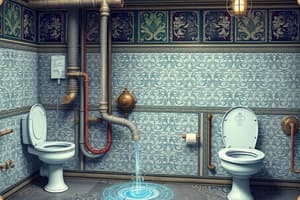Podcast
Questions and Answers
Which of the following is NOT a component typically found in a drainage system?
Which of the following is NOT a component typically found in a drainage system?
- Aqueducts (correct)
- Inlets
- Retention basins
- Channels
Proper maintenance of drainage systems is crucial to prevent which of the following issues?
Proper maintenance of drainage systems is crucial to prevent which of the following issues?
- Improved community aesthetics
- Clogs that may lead to flooding (correct)
- Reduced risk of natural disasters
- Increased water quality
Which of the following sustainable drainage solutions helps to reduce the environmental impact of stormwater management?
Which of the following sustainable drainage solutions helps to reduce the environmental impact of stormwater management?
- Channels
- Culverts
- Detention basins
- Permeable pavements (correct)
The primary purpose of a $retention basin$ is to:
The primary purpose of a $retention basin$ is to:
Which of the following is a key benefit of implementing sustainable drainage solutions?
Which of the following is a key benefit of implementing sustainable drainage solutions?
Which of the following is NOT a primary type of drainage system mentioned in the passage?
Which of the following is NOT a primary type of drainage system mentioned in the passage?
What is the primary purpose of a groundwater drainage system according to the passage?
What is the primary purpose of a groundwater drainage system according to the passage?
Which of the following is NOT mentioned as an important function of drainage systems in the passage?
Which of the following is NOT mentioned as an important function of drainage systems in the passage?
Which of the following is a sustainable solution for drainage systems mentioned in the passage?
Which of the following is a sustainable solution for drainage systems mentioned in the passage?
Study Notes
Drainage Systems
Drainage systems are essential infrastructure components that manage the collection, conveyance, treatment, and disposal of stormwater and wastewater. They ensure public health and safety, protect property from flood damage, prevent erosion, and maintain the environment. In this article, we'll delve deeper into the various aspects of drainage systems, including their importance, types, components, maintenance, and sustainable solutions.
Types of Drainage Systems
There are primarily four types of drainage systems: surface drainage, groundwater drainage, combined sewer systems, and separated stormwater and sanitary systems. Surface drainage involves collecting water flowing across the land for immediate discharge into receiving waters. Groundwater drainage focuses on pumping water from the ground to control flooding and improve soil conditions. Combined sewer systems collect sewer and stormwater in the same pipe, discharging to a wastewater treatment plant. Finally, separated stormwater and sanitary systems involve two independent systems: one for stormwater and another for sanitary sewage and industrial waste.
Importance of Drainage Systems
The significance of drainage systems extends beyond their primary purpose. These systems promote public health by removing wastewater and preventing the spread of diseases. Additionally, they facilitate economic growth by supporting agriculture, industry, and tourism. By managing rainfall effectively, they mitigate the risk of natural disasters, such as flash floods. Furthermore, properly designed and maintained drainage systems contribute to the overall aesthetics of urban areas.
Components of a Drainage System
A typical drainage system consists of several components, including inlets, channels, culverts, detention basins, retention basins, and water quality structures. Inlets, often placed at the lowest point along a street or driveway, collect and direct stormwater flow. Channels and gutters transport water along the network of pipes and basins. Culverts serve as underground tunnels that allow water to flow underneath roads and obstacles. Detention basins store excess water temporarily, releasing it slowly during periods of heavy precipitation. Retention basins capture and treat stormwater before it enters rivers or streams. Water quality structures, such as greenscapes and biofilters, further enhance the environmental performance of drainage systems.
Maintenance of Drainage Systems
Regular maintenance of drainage systems is crucial to ensure their proper functioning. This includes cleaning debris from inlets, clearing vegetation around basins, inspecting culverts for structural integrity, and repairing leaks or damages. Proactive management of tree roots, sediment deposits, and other obstacles can prevent clogs that may lead to flooding. Additionally, drainage systems should be periodically inspected for potential contamination issues and upgrades based on changing land use patterns and population growth.
Sustainable Drainage Solutions
In response to the challenges posed by increasing urbanization and climate change, sustainable drainage solutions have gained significant attention. These innovative approaches aim to reduce the environmental impact of stormwater management while enhancing community resilience. Key practices include green roofs, rain gardens, rainwater harvesting, permeable pavements, and porous concrete structures. By integrating these techniques into existing infrastructure, communities can lessen their dependence on traditional drainage systems, improve water quality, and create more liveable spaces.
Studying That Suits You
Use AI to generate personalized quizzes and flashcards to suit your learning preferences.
Description
Explore the fundamental aspects of drainage systems, including types such as surface drainage and groundwater drainage, their importance for public health and economic growth, components like inlets and culverts, maintenance practices, and sustainable drainage solutions to address urbanization and climate change challenges.



